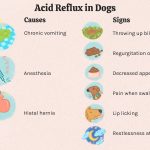As a dog owner, there’s nothing more concerning than seeing your furry friend suffer from a condition that affects their daily life and quality of time with you.
A New Furry Dilemma: Acid Reflux in Dogs
Dogs, just like humans, can experience acid reflux, also known as gastroesophageal reflux disease (GERD). It’s a condition where stomach acid flows back up into the esophagus, causing discomfort, pain, and even weight loss. In this comprehensive guide, we’ll delve into the world of acid reflux in dogs, exploring its causes, symptoms, diagnosis, treatment options, and management strategies.
Why Acid Reflux Matters
Acid reflux in dogs can have significant consequences on their overall health, behavior, and well-being. If left untreated or poorly managed, it can lead to complications such as:
- Painful esophagitis and inflammation
- Weakened immune system
- Malnutrition due to difficulty eating
- Increased risk of secondary infections
In this first part of our guide, we’ll explore the common causes of acid reflux in dogs, including diet, lifestyle factors, and underlying health conditions. By understanding these triggers, you’ll be better equipped to identify potential signs and symptoms in your furry friend.
Common Causes of Acid Reflux in Dogs
The root cause of acid reflux in dogs can vary depending on the individual dog’s circumstances. However, some common factors that contribute to this condition include:
- Dietary changes or sensitivities (e.g., food allergies, intolerances)
- Lifestyle habits (e.g., eating too quickly, gobbling food)
- Underlying health conditions (e.g., gastrointestinal disorders, metabolic issues)
In the next section of our guide, we’ll examine the symptoms and diagnosis process for acid reflux in dogs. By recognizing the warning signs and understanding how your veterinarian will assess your dog’s condition, you’ll be better prepared to take action and ensure your furry friend receives the best possible care.
Now that we’ve explored the common causes of acid reflux in dogs, let’s dive deeper into the symptoms and diagnosis process.
Symptoms of Acid Reflux in Dogs
Acid reflux in dogs can manifest in various ways, depending on the severity of the condition. Some common signs to look out for include:
- Regurgitation or vomiting, especially after eating or drinking
- Whining or whimpers while eating due to discomfort
- Lack of appetite or interest in food
- Coughing or gagging as a result of stomach acid flowing up into the throat
- Panting, drooling, or excessive salivation due to stress and discomfort
If you suspect your dog is experiencing acid reflux, it’s essential to consult with your veterinarian. They will perform a physical examination, take a thorough medical history, and may conduct additional tests to rule out other potential causes of your dog’s symptoms.
Diagnosing Acid Reflux in Dogs
To diagnose acid reflux in dogs, veterinarians often rely on the following methods:
- Barium swallow: A non-invasive test that uses a liquid barium to visualize the esophagus and stomach during an X-ray.
- Endoscopy: A minimally invasive procedure where a flexible tube with a camera is inserted through your dog’s mouth to examine the esophagus and stomach.
- Pain assessment: Your veterinarian may perform a pain assessment to determine if your dog is experiencing discomfort or pain related to acid reflux.
Once diagnosed, your veterinarian will work with you to develop a treatment plan tailored to your dog’s specific needs. In the next section of our comprehensive guide, we’ll explore the various treatment options and management strategies for acid reflux in dogs.
Learn more about canine gastrointestinal disordersStay tuned for part two of our guide, where we’ll delve into the treatment options and management strategies for acid reflux in dogs. With the right approach, you can help your furry friend feel better and enjoy a higher quality of life.
Get Expert Advice on Acid Reflux in Dogs
Take the first step towards a healthier and happier pup. Consult with our expert pet care advisors today.
Start chatIn this comprehensive guide, we’ve explored the world of acid reflux in dogs, covering its causes, symptoms, diagnosis, treatment options, and management strategies.
Summary: Key Takeaways
We began by highlighting the importance of recognizing acid reflux in dogs, as it can have significant consequences on their overall health, behavior, and well-being. We then delved into the common causes of acid reflux in dogs, including dietary changes or sensitivities, lifestyle habits, and underlying health conditions.
Insights from Our Guide
By understanding these triggers, you’ll be better equipped to identify potential signs and symptoms in your furry friend. Remember that every dog is unique, and it’s essential to consider their individual circumstances when evaluating the causes of acid reflux.
A Strong Conclusion
As we wrap up this guide, remember that early detection and proper management are crucial in addressing acid reflux in dogs. By working closely with your veterinarian and implementing a tailored treatment plan, you can help your furry friend feel more comfortable, reduce symptoms, and prevent complications.
If you’re concerned about your dog’s acid reflux or have noticed any of the warning signs we discussed, don’t hesitate to schedule an appointment with your veterinarian. With the right guidance and support, you can help your beloved companion live a happier, healthier life – free from the discomfort of acid reflux.
The best mixed dog breeds for apartments: Are you looking for the perfect furry companion for your apartment lifestyle? We’ve got you covered! Our expert guide reveals the top mixed dog breeds that thrive in small spaces. From low-shedding to high-energy, discover the best breeds for apartment living!
2 week old puppy a bloated condition: Is your new furry friend showing signs of a bloated belly? Don’t worry! Our expert guide helps you identify the causes and symptoms, as well as what to do if your 2-week-old puppy is experiencing a bloated condition. Learn how to keep your pup healthy and happy!



